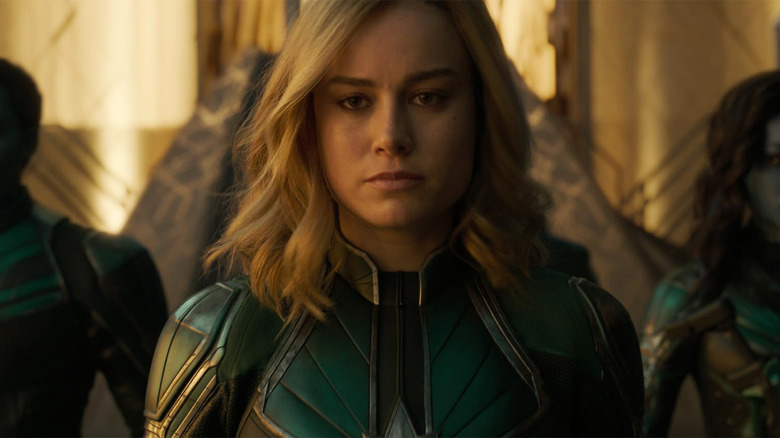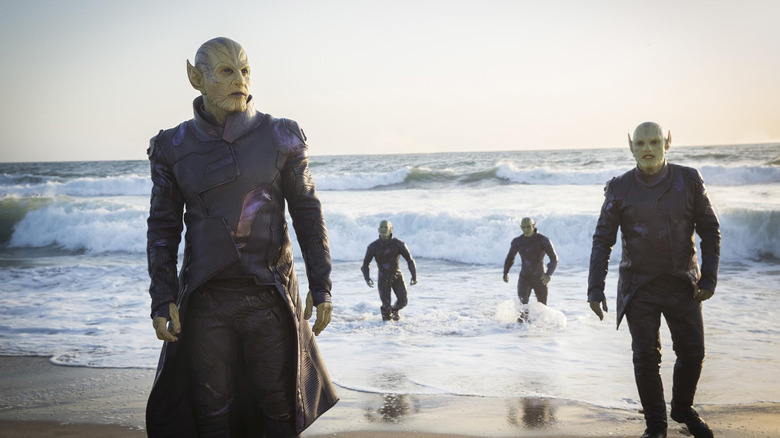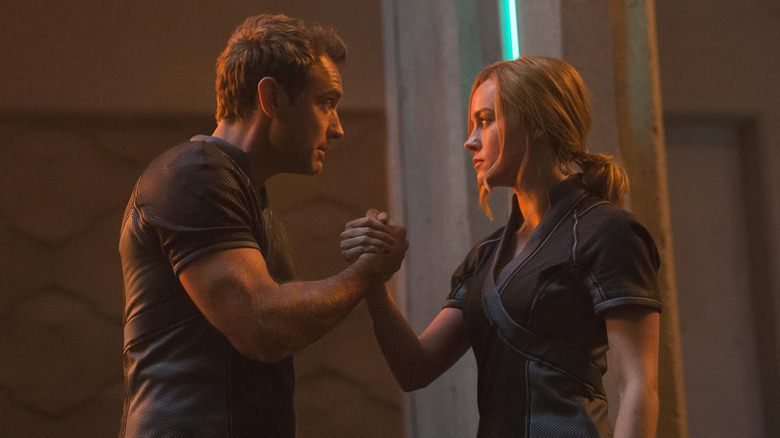The Real-World Soldier That Inspired Captain Marvel's Kree Twist
The premise of "Captain Marvel" was borne out of unique, if limiting, circumstances. The film was the 21st entry in Marvel's Cinematic Universe, and the first to put a female hero center stage (totally and completely overdue, of course, but that's another story). Perhaps more than any MCU film that'd preceded it, "Captain Marvel" had a complicated brief to adhere to. It was introducing one of the most prolific heroes in Marvel history at a veritable late point in the franchise, just before "Avengers: Endgame" brought about the end of the Infinity Saga. "Captain Marvel" also needed to establish the title heroine as someone with a history, all while avoiding a decades' worth of continuity concerns.
Where had Carol Danvers been while the Avengers defended an alien attack, or assembled against Thanos in "Infinity War"? "Captain Marvel" had a bevy of questions to answer — or, more accurately, to avoid — and according to insider book "MCU: The Reign of Marvel Studios," it forced screenwriters Nicole Perlman and Meg LeFauve to craft an intricate story around the character.
Making "Captain Marvel" a period piece seemed to be the ideal solution. "We discussed the idea of setting it in the '60s," Perlman said, "But then 'Hidden Figures' was coming out, and we didn't want to set something in the same time period." The writers briefly toyed with an origin story set in the '80s, then during Y2K, before settling for a mid-'90s adventure. That way, "Captain Marvel" could also serve as an origin story for Nick Fury and his Avengers Initiative, while avoiding any potential crossover with other heroes. Still, Carol couldn't remain on Earth for long. That complication opened the door for an interesting fish-out-of-water storyline, one that saw Carol adopted (and indoctrinated) by an alien race. And when it came time to create the character's motivations, the screenwriter drew inspiration from a real-life soldier.
The truth about Skrulls
Thanks to "Guardians of the Galaxy," alien species like the Kree were already more or less established by the time "Captain Marvel" came around. Perlman had been closely involved in the development of "Guardians," penning the first iteration of its script, and a lot of her influence extends to "Captain Marvel" as well. The latter film introduces Carol Danvers as Vers: a Kree foundling who suffers from selective amnesia. She's a member of the Kree Starforce, a corps that's been engaged in battle with the shape-shifting Skrulls for eons.
At first blush, the Skrulls are positioned as the true villains of "Captain Marvel." And for fans of the comics, that wasn't much of a surprise. The Skrulls have been longtime villains and a persistent threat to Earth, orchestrating events as far-reaching as "Secret Invasion." But for Perlman, it was "really important" that the Skrulls weren't actually the villains of the story. "Guardians" had already established the Kree as a real antagonistic force: Ronan the Accuser (Lee Pace) was briefly allied with Thanos, after all. It wouldn't take much to reinforce that brief, turn the Kree into imperial invaders and the Skrulls into refugees — but it was equally important to set Carol apart from the Kree in any way possible.
Once Brie Larson was cast in the role, that priority became that much more attainable. "When Meg and I first met Brie, we were just so bowled over by her empathy," Perlman recalled. "I think that was the first time we started talking about empathy as a superpower, just being impressed by how Brie Larson really gives a s***."
'What if I'm not the good guy here?'
Carol might start off aligned with the Kree, but it's only because their cultures and customs are all she knows. She's been fed their lies, and trained to control her inner emotions, to better serve their interests. But once she grows wise to the Kree's true nature — and the part they played in her own amnesia — she doesn't hesitate to switch sides and fight for the Skrull.
Carol's memory loss goes a long way in selling the film's big twist. It might have been depicted in a heightened way, but Perlman drew inspiration from a much more grounded source. The writer's husband, like Carol, was once a solider — and he found himself questioning his loyalties in the midst of America's War in Afghanistan:
"My husband was deployed right after 9/11, and he was so sure that he was fighting for the good guys. He was a chemical weapons officer and obviously there were no chemical weapons in Iraq, so he had this moment of wondering, 'What if I'm not the good guy here?' That was a big influence for Captain Marvel too. She's been told that they're the good guys and she believes it. What happens when you crack that open? That was an important element to include."
Larson obviously sells her own internal conflict as best she can, but for all the empathy that Perlman and LeFauve saw in the actor, there's not a whole lot of that on display in "Captain Marvel." Apart from her restrained performance, the film as a whole struggles to embrace the true nuance it's chasing. Like so many Marvel films that preceded it, the 2019 film still feels a bit like propaganda: it's critical of one imaginary, fascistic force, but it's still pretty favorable towards the U.S. military.
That said, Perlman and Le Fauve had quite a tall order otherwise. The fact that "Captain Marvel" manages to provide its heroine with a solid, straightforward story is nothing short of a miracle. Sure, it's created its fair share of problems since (looking at you, "Secret Invasion"), but at the time, it did the trick.


